Friday, 3rd of January 2014, 7pm, Tel Aviv
Yael Ravid and Goor Somer (Israelis), Habtom Mesfin from Eritrea
Project.kitchentalks@gmail.com, www.facebook.com/ProjectKitchenTalks
As there wasn’t the adequate atmosphere to take notes for a protocol, we decided to print the curatorial text from Kitchen Talks catalog by Yael – thanks for that!
About Kitchen Talks
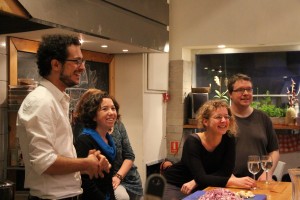
Kitchen Talks is a socially engaged curatorial project that provides an interactive platform for asylum seekers and Israelis through food, language and participation. The project was conceived within the framework of the Curatorial Studies Program of HaKibbutzim College of Education and the CCA Tel Aviv. It offers a dynamic curatorial model in which the kitchen is transformed into a communal space conducive not only for preparing meals, but also for engaging in a dialog. The aim of the project, therefore, is to enable asylum seekers and Israelis, whose communication is limited, at best, and, at worst, non-existent, to get to know each other better and collaborate.
Kitchen Talks take place during three-hour-long cooking workshops instructed by asylum seekers from Sudan, Eritrea, the Ivory Coast, and Nigeria. Between April and June 2013, eight such sessions were held in Israeli private homes in Tel Aviv and Givatayim. Six to ten paying diners participated in each Workshop. Beside the curator and the producer, who share the Vision of the project, the staff of Kitchen Talks consists of photographers and reporters who document and cover the meetings. From the very outset, it was clear to everyone concerned that the project was to be a participatory venture based on the mutual involvement of all participants.
These meetings were defined as an initial series of sessions meant to test the feasibility of such a project. To mark the end of the first series, we held a festive event at the Tarnegol Restaurant in Jaffa. On this occasion, two cooks, one from Sudan and one from Eritrea, operated the restaurant for the whole evening with the help of Israeli and asylum seeker volunteers.
By creating a platform for teaching their traditional dishes, Kitchen Talks actually offer asylum seekers an opportunity to share a facet of their culture with others. The Population of asylum seekers is virtually transparent within Israeli public life and society. Moreover, most of the Israeli public treats them with great suspicion due to their temporary and uncertain status, which prevents them from attaining work visas. Among other things, this suspicion extends also to their seemingly inaccessible culinary culture, with its unfamiliar ingredients and dishes. Thus the project of Kitchen Talks brings together people who, in all likelihood, would otherwise have never met, let alone become friends. On top of that, it offers the cooks an additional source of income.
Food and Language
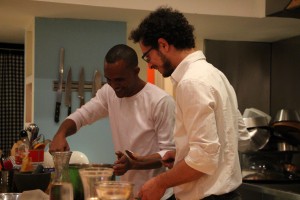
Food and language, the underlying elements of the project, are among the factors that may facilitate intimacy and communication between people. Linguistically, Kitchen Talks are not conducted in either of the various participants‘ mother tongues. Most of the project’s cooks master the Hebrew language as far as food is concerned. Gaining this specific fluency in a language foreign to them is essential for their daily needs (buying food, for example) and in many cases helps them in the workplace (usually restaurants‘ kitchens). In the workshops, the names are translated to the languages of all participants.
Food is the focal point of the verbal exchanges that take place in Kitchen Talks: around it revolve the introductory conversations and then the discussions about cooking methods, eating manners, ingredients and their availability in Israel, and the adaptation of dishes following one’s move to another country. In the course of the workshops, we have discovered an important aspect of the relationship between food and culture, namely its mnemonic function or link to memory: some of the cooks told us they learned to cook in Israel because they missed their mother’s home cooking. Moreover, in some cultures, food has a sacred meaning signified by communal eating. The choice of which dishes to teach reflected the world view of each and every cook: some opted for festive dishes eaten at weddings and other special events, whereas others opted for everyday dishes.
In the spirit of reciprocity, the hosts of the workshops were asked to make their favorite dish and present it to the cook at the end of each session. Thus, in addition to a closer look at the Israeli way of life, the cook got to take the gifted dish to his or her home and have a taste of Israeli home cooked food. Cooking and eating together transformed each encounter into a laboratory of collective experiences shared by all participants. Food became a component in the performance that was re-created in each and every meeting. The repetitive ritual – cutting vegetables, dicing onions with teary eyes, mixing ingredients and eating with one’s hands – brought forth a body language that complemented the spoken ones.
Food and Art
As a curator and an artist, I conceived the project of Kitchen Talks with the understanding that socially engaged art would allow me to delve into the nexus of art and society. I envisaged the project as a platform not only for
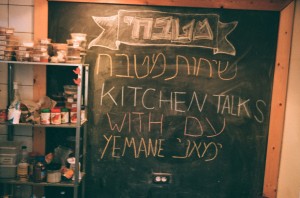
presenting and discussing issues that are otherwise marginalized, but also as a means of offering a solution of my own. Curating such as this involves research of cultural contexts as well as emotions and feelings.
In the field of socially engaged art, numerous projects have dealt with the relationships between different communities through food and language practices that provide a basis for social interactions. Thus, for example, at the Kassel 2012 Documenta 13, The Art of Sahrawi Cooking, a collaborative project of American artist and curator Robin Kahn and a collective of refugee women from Western Sahara, was presented. The traditional communal tent set up on the exhibition grounds hosted a series of events such as dance shows and cooking workshops. The visitors were invited to learn the art of traditional couscous cooking and tea making. Additionally, discussions held in the tent raised awareness of important Saharan issues such as the rights of refugee women, the harsh conditions in Algeria’s refugee camps, the colonial policies of neighboring Morocco, etc. Another example of such a project is The Lewinsky Garden Library near Tel Aviv’s central bus station. The library was founded by ARTEAM, an interdisciplinary art collective chaired by artist Hadas Ophrat and curator Tali Tamir. It was conceived as an art project addressed to foreign migrants and asylum seekers living in South Tel Aviv.
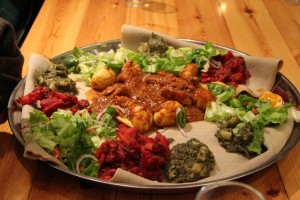
The glass doors of the bookcase allow one to see the books during the library after hours. The books are not cataloged according to subject matters, but rather according to the emotions they evoke: upon completing reading a book, each reader, in his or her turn, marks it with a sticker indicating the feeling best describing the book. A reader may concur or disagree with the judgment of previous readers, and it is the last reader who determines the emotional classification of the book.
Kitchen Talks shares many characteristics with other socially engaged projects. It hasn’t got a clear narrative with beginning, middle and end. It is a dynamic project in a state of constant flux. The end product (the joint meal) is not a marketable art object in terms of conventional gallery-curator-artist relationship. Moreover, since it is not identified with a certain medium or technique, it undermines mainstream definitions of art. A project such as Kitchen Talks cannot be reviewed according to conventional criteria of exhibitions shown in classic art-display Spaces and does not lend itself to absolute cataloging. The same boundary-blurring extends to the artist/curator relationship in such a project. The artist is also the project’s curator, and vice versa.
Kitchen Talks constitutes a new proposal for an alternative model of curating. It requires of me, as a curator and an artist, to be simultaneously producer, culture researcher, art theorist, social activist, group moderator, mediator between communities, and so on. I regard each of the project’s encounters as a comestible exhibition of an artist-cook who executes an interactive live cooking performance. The work culminates with the joint meal. Several variables are noticeable in this model – the scene changes as each workshop is held in a different kitchen; the number of participants fluctuates according to the capacity of any given kitchen; the cooking aromas change in accordance with the different ingredients; the cook changes from one meeting to the next. As a matter of fact, the only constants are the curator/artist and the producer who define the character of the comestible exhibition and dwell upon the small details that illuminate its products and outcomes.
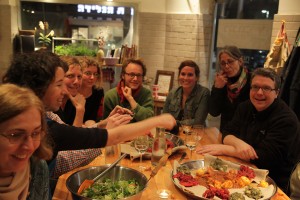
Links and further reading
http://www.jpost.com/National-News/Friends-bid-farewell-to-prison-bound-African-asylum-seeker-339016
http://www.tabletmag.com/jewish-life-and-religion/138913/kitchen-talks-african-cuisine
http://www.haaretz.com/culture/food-wine/.premium-1.529412
http://www.haaretz.com/news/features/.premium-1.576315
CNTV story on Hassan Shakur from Sudan
http://english.cntv.cn/program/africalive/20140227/100758.shtml (from about 23:30 on up to 28:35)
http://english.cntv.cn/program/newsupdate/20140226/100093.shtml
http://english.cntv.cn/program/africalive/20140226/100524.shtml
